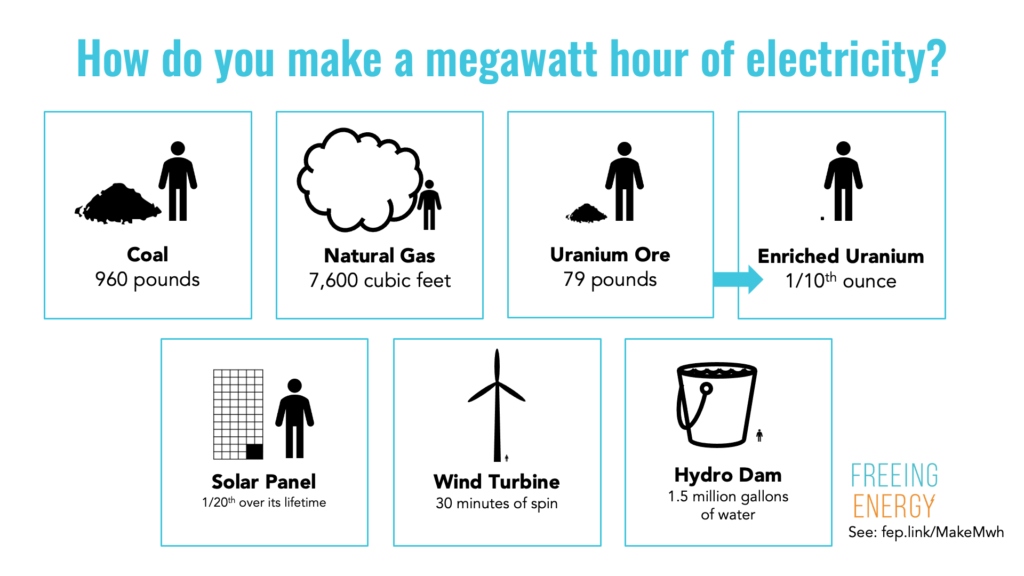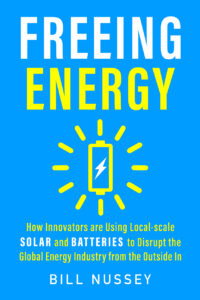While a megawatt measures the power or capacity of an electric system, a megawatt-hour represents how much electricity is delivered through that system in an hour. For example, if a 1 megawatt solar array runs in the full sun for an hour, it will theoretically produce 1 megawatt-hour of electricity.
Most people are used to seeing electricity measured in kilowatt-hours on their electric bills. A megawatt hour is simply 1000 kilowatt-hours. Other common measurements are gigawatt-hours (1000 megawatt-hours), terawatt-hours (1000 gigawatt-hours), and petawatt-hours (1000 terawatt-hours). To put these massive numbers in perspective, the US uses a bit over 4 petawatt-hours of electricity each year, while the sun delivers around 192,000 petawatt-hours to the Earth’s seven continents each year.
Making a megawatt-hour
So what resources are needed to produce a megawatt-hour of electricity? It takes approximately:
- 1,100 pounds of coal1
- 7,600 cubic feet of natural gas2
- 1/20th of a solar panel over its lifetime3
- A wind turbine spinning for 30 minutes4
- 1.5 million gallons of water flowing over a hydro dam5
- 79 pounds of uranium ore and 0.1 ounce of enriched uranium6

Further Reading:
What can you do with a megawatt-hour of electricity?
Understanding the basics of electricity
What is the best way to make electricity?
GET MONTHLY NEWS & ANALYSIS
Unsubscribe anytime. We will never sell your email or spam you.
Sources
- The US Energy Information Administration (EIA) has tons of information on coal, like their coal home page and lots of cost data on coal.
- The EIA also has a home page on all-things-nuclear here.
- To see all the sources used in this analysis, as well as the math, tying it together, you can download the spreadsheet and take it for a ride yourself.
- Math; It takes 1.1 pounds of coal to make a kilowatt-hour of electricity, Freeing Energy [↩]
- Unit – Megawatt Hour Sources (mhws).xlsx, tabs mwhs.3, mwhs.4, Freeing Energy [↩]
- Unit – Megawatt Hour Sources (mhws).xlsx, tab mwhs.5 Freeing Energy [↩]
- Unit – Megawatt Hour Sources (mhws).xlsx, tab mwhs.6, Freeing Energy [↩]
- Unit – Megawatt Hour Sources (mhws).xlsx, tab mwhs.7 Freeing Energy [↩]
- cost – nuclear (nu).xls, tabs nu.3, nu.4, nu.5, nu.6 Freeing Energy [↩]




23 Responses
A megawatt-hour (MWh) is a unit of energy equal to one million watts of power used continuously for one hour. It is commonly used in the electricity industry to measure and bill for large amounts of energy consumption over time, such as from industrial or commercial customers.
Great post! I had no idea that a megawatt-hour was a unit of energy equivalent to one million watt-hours. It’s amazing to think about the amount of energy that powers our daily lives and the impact it has on our environment. Thank you for shedding light on this topic!
Interesting read! I had no idea a megawatt-hour was a unit of measure for electricity. Thanks for breaking it down and making it easy to understand!
This post really clarified the concept of megawatt-hours for me! It’s fascinating how this unit helps us understand energy consumption on a larger scale. Thanks for breaking it down so clearly!
This post really helped me understand the concept of a megawatt-hour! I always heard the term but never grasped its significance in energy consumption and production. Thanks for breaking it down so clearly!
Great explanation of what a megawatt-hour is! I never realized how it could impact our energy consumption and costs. Thanks for breaking it down in such simple terms!
Great explanation of megawatt-hours! It’s fascinating to learn how this unit is used to measure energy consumption over time. I had no idea it was so crucial for understanding power usage in our homes and industries. Thanks for breaking it down!
Thanks for breaking down the concept of a megawatt-hour! It’s really helpful to understand how this measurement relates to energy consumption and production. I never realized how much energy a single megawatt-hour represents. Looking forward to more posts like this!
Thanks for breaking down what a megawatt-hour is! It’s a concept I often hear in discussions about energy but never fully understood. Your explanations make it much clearer how it fits into our energy consumption and production. Looking forward to more posts like this!
This post clarified a lot for me! I always heard the term “megawatt-hour” but wasn’t quite sure what it meant in practical terms. The examples really helped make it relatable. Thanks for breaking it down!
Great explanation! I had a vague idea of what a megawatt-hour represented, but your breakdown made it much clearer. It’s fascinating how energy consumption is measured and reported. Thanks for sharing!
Great explanation of megawatt-hours! I never realized how significant this unit is for understanding energy consumption. It really puts into perspective how much energy our daily activities require. Thanks for breaking it down so clearly!
Great explanation! I had always heard the term “megawatt-hour” thrown around, but this post really clarified its meaning and importance in energy consumption. Thanks for breaking it down so simply!
This was a really informative post! I never realized how significant a megawatt-hour is in terms of energy consumption. It’s great to understand the scale behind electricity generation and usage. Looking forward to more posts like this!
This was a very informative post! I had heard the term “megawatt-hour” thrown around but never really understood what it meant until now. Thanks for breaking it down in such a clear and concise way!
I really appreciate how clearly you’ve explained MWh and its applications. It’s amazing how energy calculations impact real-world projects.
Great explanation! I’ve always heard about megawatt-hours but never fully understood how they relate to energy consumption. This cleared things up for me, especially how it impacts our electricity bills. Thanks for breaking it down!
Great explanation! I never really understood the difference between megawatts and megawatt-hours before reading this. It’s fascinating how energy consumption is measured. Thanks for breaking it down so clearly!
Great explanation of what a megawatt-hour is! It’s impressive to see how this unit of energy impacts our everyday lives, especially in relation to renewable energy sources. Thanks for breaking it down so clearly!
Great explanation of what a megawatt-hour is! I’ve always been confused about energy measurements, and this post made it much clearer. Thanks for breaking it down in such an understandable way!
Great explanation of megawatt-hours! It’s fascinating to see how this unit helps us understand energy consumption in a more tangible way. I had no idea about the distinction between megawatt-hours and kilowatt-hours, so that was very enlightening. Looking forward to more posts like this!
Great explanation! I appreciate how you broke down the concept of a megawatt-hour and its significance in energy usage. It really helped clarify things for me.
This post really clarified what a megawatt-hour is! I had always heard the term but didn’t understand its significance in energy consumption. The examples you provided helped me grasp how it relates to everyday electricity use. Thanks for the informative breakdown!